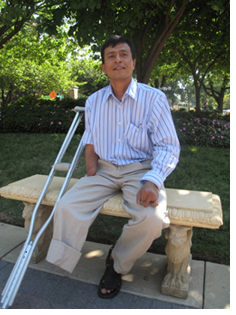Myo Myint
Myo Myint
 The worse day of Myo Myint’s life could have been the day he went into a Burmese field in 1984 to clear landmines to set up artillery. At the age of 17, he was a military engineer for the Burmese Army, which was in a civil war with the Burmese Communist Party. As the young soldier rested after clearing the area, an enemy mortar shell landed near him which set off undetected landmines that blew off his right forearm, his right lower leg and fingers from his left hand.
The worse day of Myo Myint’s life could have been the day he went into a Burmese field in 1984 to clear landmines to set up artillery. At the age of 17, he was a military engineer for the Burmese Army, which was in a civil war with the Burmese Communist Party. As the young soldier rested after clearing the area, an enemy mortar shell landed near him which set off undetected landmines that blew off his right forearm, his right lower leg and fingers from his left hand.
Myint came out of this near-death experience a changed man. He began a crusade against war and in favor of democracy. Those actions had him thrown in prison.
“I was a political prisoner. I was arrested three times for my political activism. I wanted to stop civil war. I wanted to rebuild my country as a democratic establishment, not a military establishment,” said Myint, who spent the worst days of his life imprisoned and tortured for a total of 14 years, 11 months and 26 days.
Myint endured daily beatings, spending days confined to a six-foot by six-foot room without any light, and surviving at times with just water and no food.
“The military especially hated me because I was former military,” said Myint, now 48 and living in Fort Wayne, Indiana. “I tried to explain that I was not against the Burma Army, I was against the military dictatorship and its politics.”
Myint eventually was released from prison in 2004. The desire to help liberate his people still yearned inside of him. But acting on those impulses could lead to a longer prison sentence if he was caught so he fled to Thailand in 2005.
After three years in Thailand, the International Rescue Committee recognized Myint as a refugee. Because his younger brother had resettled in America 11 years ago to escape the fate of his elder brother, Myint was allowed to come to America after a thorough interview with the US Department of Homeland Security.
Myint chose to live in the Burmese refugee community located in Fort Wayne. Around 8,000 Burmese have successfully resettled in the Indiana community.
“These refugees may not have formal education or have learned about America,” said Myint. “Helping them is my new politics.”
Although disabled, Myint found employment through a job placement program funded by the Office of Refugee Resettlement. He works as an editorial consultant on the local station, Radio Free Asia, during its Burmese hour. Myint also volunteers as an interpreter and translator for Catholic Charities, the American Red Cross and Fort Wayne Police Department.
For more information on the Office of Refugee Resettlement, visit www.acf.hhs.gov/programs/orr/
Founded on the belief that newly arriving populations have inherent capabilities when given opportunities, the Office of Refugee Resettlement provides people in need with critical resources to assist them in becoming integrated members of American society. Since 1975, the U.S. has resettled approximately 2.6 million refugees. Today, the U.S. takes in more refugees than all other countries combined. In Fiscal Year 2010, ORR provided more than 101,000 refugees with resettlement assistance. Only less than half of one percent of the refugees in the world (around 62 million) gets resettled. For more information, visit www.acf.hhs.gov/programs/orr/index.html
